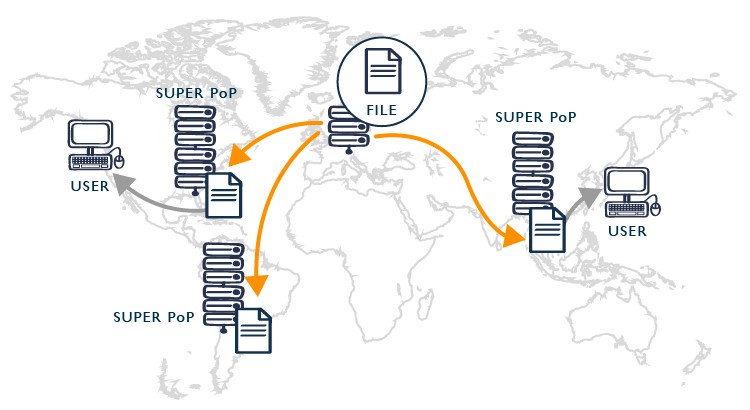What is a CDN and Why is it Important for Websites?

In today’s digital landscape, businesses are constantly searching for ways to deliver content quickly and seamlessly. With the increase in internet penetration and faster internet speeds, consumers have higher expectations when it comes to accessing services and information online. This has led to the rise of Content Delivery Networks (CDNs), which play a crucial role in improving website performance and user experience.
Understanding CDNs
A Content Delivery Network, or CDN, is a network of geographically distributed servers that work together to deliver content to users with minimal latency. CDNs are designed to optimize website performance, reduce load times, and enhance reliability. By caching website content on servers strategically located around the world, CDNs ensure that users can access the content quickly, regardless of their geographic location.
CDNs work by distributing the load of network traffic across multiple servers, preventing any single server from becoming overwhelmed. This not only improves website speed but also enhances reliability, as CDNs can continue to operate even during server outages or network congestion.
The Benefits of Using a CDN
CDNs offer several significant benefits for businesses:
1. Increased Reliability
One of the key advantages of using a CDN is increased reliability. CDNs balance the load of network traffic, ensuring that no single server is overworked. This means that even if one server goes down or becomes congested, the CDN can route the traffic to another server, ensuring that web applications continue to operate smoothly. This is especially important for businesses that rely on their websites to provide uninterrupted services to their customers.
2. Improved Website Performance
CDNs can significantly improve website performance by reducing load times. By caching website content on servers located closer to end-users, CDNs minimize the distance that content needs to travel. This, in turn, reduces latency and improves response times. Additionally, CDNs optimize servers to respond faster to user requests, further enhancing website performance. Studies have shown that using a CDN can reduce load times by up to 50%, leading to better user experiences and increased customer satisfaction.
3. Cost Savings
CDNs can help businesses save costs by reducing the number of exchanges between the origin server and end-users. With CDNs, much of the website’s content is cached on the CDN servers, eliminating the need for the origin server to repeatedly deliver the same content. This reduces the workload on the origin server and can lead to significant cost savings in terms of bandwidth and server resources. Additionally, CDNs can help prevent revenue loss by providing uninterrupted services during server outages or cyber attacks.
4. Protection Against Cyber Attacks
Cyber attacks, such as Denial-of-Service (DoS) and Distributed Denial-of-Service (DDoS) attacks, can disrupt website operations and lead to significant losses for businesses. CDNs play a crucial role in defending against these attacks by absorbing large quantities of junk network traffic. By distributing the load across their network, CDNs can keep websites running smoothly even when under attack. This ensures that businesses can continue to provide services to their customers without interruption.
Types of Businesses That Benefit from Using a CDN
Any business that has an online presence can benefit from using a CDN. Here are some common industries where CDNs are often found:
1. E-commerce
E-commerce businesses rely on CDNs to ensure that their websites are available 24/7. With continuous uptime, these businesses can serve a wider audience and maximize profits. CDNs help optimize website performance, ensuring that product pages load quickly and customers can easily make purchases. This leads to better customer experiences, increased conversions, and improved customer retention rates.
2. Education
The rise of online courses has made education more accessible to people around the world. Many online courses require streaming audio and video lectures, which can put a strain on network connections. CDNs help ensure that participants can access course content quickly and without interruptions, regardless of their location. This enhances the learning experience and allows educational institutions to reach a global audience.
3. Media and Entertainment
Media and entertainment websites often rely on streaming services to deliver content to users. Whether it’s video streaming, music streaming, or online gaming, CDNs play a crucial role in ensuring smooth content delivery. By caching content on servers located closer to end-users, CDNs minimize buffering and lag, providing users with a seamless streaming experience. This is essential for media and entertainment businesses looking to engage and retain their audience.
4. Online Gaming
Online gaming is one of the most demanding applications in terms of data and transactions. Gaming companies must provide maximum uptime to ensure that players have access to their games whenever they want to play. CDNs offer the necessary infrastructure to support online gaming, with features such as high availability, reliability, fault tolerance, and scalability. By distributing the load across multiple servers, CDNs ensure that gamers can enjoy uninterrupted gameplay, regardless of their location.
Conclusion
In today’s fast-paced digital world, businesses need to deliver content quickly and seamlessly to meet the expectations of their customers. Content Delivery Networks (CDNs) provide a solution to this challenge by optimizing website performance, reducing load times, and enhancing reliability. By distributing website content across a network of servers located around the world, CDNs ensure that users can access content quickly, regardless of their location. CDNs offer numerous benefits, including increased reliability, improved website performance, cost savings, and protection against cyber attacks. Businesses in various industries, such as e-commerce, education, media and entertainment, and online gaming, can benefit greatly from using CDNs. By leveraging the power of CDNs, businesses can provide better user experiences, reach a wider audience, and maximize their online presence.




